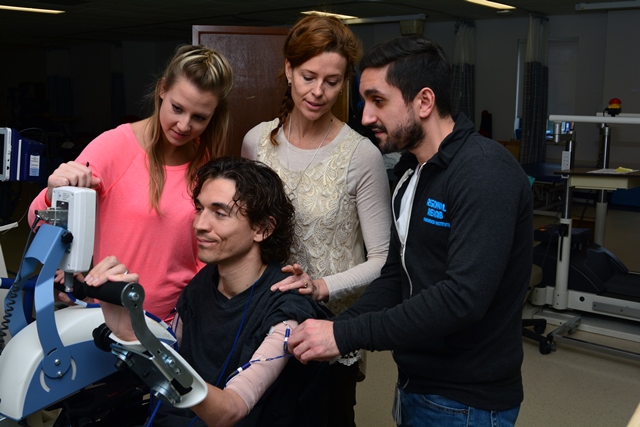Canada’s first arm cycling program is in place at Parkwood institute for patients with a spinal cord injury
A new #therapy at St. Joseph’s Health Care London’s Parkwood Institute is helping Dan Harvey with simple tasks most would take for granted like adjusting a thermostat, reaching the radio in his van, or turning on a light switch.
In 2003, when Dan was just 17, he ricocheted off a trampoline and landed head first in a foam-filled pit. “I had no idea what was happening, I just knew I couldn’t move and called for help,” says Dan. The fall resulted in a compression fracture of his C4 cervical vertebrae, and an incomplete spinal cord injury, which means he still has some motor function in his arms.
To increase his muscle strength and range of motion, and reduce neck and shoulder pain and muscle spasms, Dan is working with the Upper Extremity Functional Electrical Stimulation (FES) Program—an arm cycling program for those with a spinal cord injury who have upper limb paralysis or weakness.
When the spinal cord is working as it should, the body sends electrical impulses to contract muscles. Because this process doesn’t work for those with a spinal cord injury, the FES #cycle replicates the process. It cycles forward and backward for a programmed period of time, targeting specific muscle groups to contract when they receive electrical stimulation through electrodes. “I can actually feel the electrical current going into my muscles,” says Dan.
If the muscle fibers become fatigued during cycling, a motor kicks in to provide relief. The bike also tracks whether individuals are using electrically stimulated arm muscles to power the cycle, or whether the motor is helping them with the motion.
MORE: THERAPEUTIC RECREATION SUCCESS STORIES
“The Upper Extremity FES has many benefits, including relaxing muscle spasms and preventing muscle atrophy,” explains occupational therapist (OT) Sarah Miles who together with her OT colleague Manny Paiva assesses patients and helps them set goals for the FES program. “We believe we are the first program in Canada offering this therapy in a clinical setting,” adds Manny.
Fitness instructor Kari Logie oversees the logistics of setting patients up on the FES program, such as attaching the electrodes and calibrating the cycle. Students from health sciences and kinesiology at Western University help support this therapy.
Now four months into the Upper Extremity FES program, Dan—who lives with his wife and two “ridiculous” cats—is excited about the small changes he’s noticing in his arm movement and strength. “It is these small, incremental victories like having a little more strength to reach a button in my van and to close the door on the first try—instead of after multiple attempts—that are helping me become more independent.”
To view a video of the therapists and Dan with the FES bike visit www.sjhc.london.on.ca




